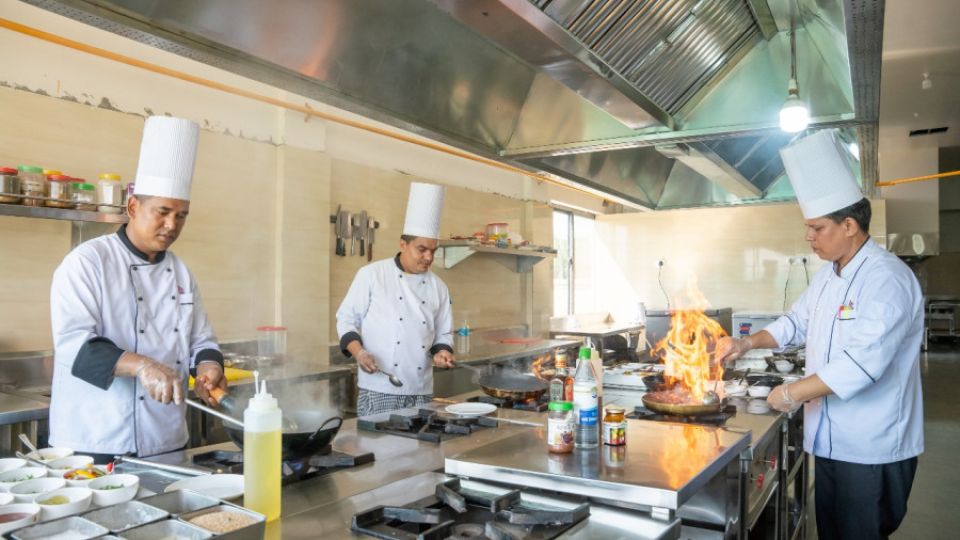July 4, 2025
KATHMANDU – Hotels and restaurants across Rupandehi are experiencing a growing labour shortage, despite offering steady employment at the local level.
The booming hospitality sector, especially in Bhairahawa and surrounding areas, has created thousands of jobs, yet employers say retaining staff has become a major challenge as most workers treat the job as a stepping stone to go abroad or shift to higher-paying casinos.
With a surge in tourism and hotel investments, many hotels and restaurants are hiring large numbers of staff and offering on-site training. These jobs provide local youths an opportunity to earn while gaining experience in a growing industry. However, hotel owners say that only 27 to 30 percent of their staff remain long-term, while the majority leave within months. Many employees quit after completing basic training, resulting in a cycle of costly retraining and high turnover.
“Hospitality jobs have become informal training centres for those planning to go abroad,” said Rupak Gautam, managing director of Royal Tiger Recreation Pvt Ltd. “They agree to work for a year but often leave well before completing their contracts.”
His company provides employee benefits like provident fund, health and accident insurance, and even pays up to Rs200,000 per month depending on position.
Yet, foreign employment remains more attractive.
Royal Tiger alone employs around 600 workers in roles such as kitchen staff, housekeepers, drivers, and security guards. Despite the incentives, new workers are needed almost every week.
“We train them with food, lodging, and uniforms, investing over a lakh per person,” said Tika Baral, operator of the Lumbini Buddha Garden Resort. “Still, many leave to go abroad or join other hotels.”
The constant churn is also due to students who join for short stints while studying and then move on. Even graduates in hotel management fail to stay long in the sector. Baral says some of his earliest employees are no longer with him. He believes the sustainability of the hotel business hinges on reliable, skilled workers. “Without trained staff, service quality drops, and long-term business becomes difficult,” he said.
Industry insiders say the problem extends beyond just hotels and restaurants. Casinos operating in the region, which offer significantly higher wages, are pulling in trained hospitality staff. A single casino may employ up to 1,000 workers, creating additional pressure on the hotel labour market.
According to Chandra Prakash Shrestha, president of the Siddhartha Hotel Association, more than 150 quality hotels operate between Belahiya and Lumbini, employing over 10,000 workers. Across the district, an estimated 50,000 people are employed in the hospitality sector. “Employees are the backbone of our business,” said Shrestha. “But it’s difficult to retain them because of the lure of foreign jobs and better-paying alternatives.”
The situation is not unique to a single hotel.
Rajesh Malhotra, deputy general secretary of the Hotel Entrepreneurs Federation Nepal, said that in his decade of running Hotel Sunstar, 90 percent of his staff have resigned. “We’ve stopped expecting long-term commitment and now hire fresh youth and train them ourselves,” he said. “But preparing one employee costs at least Rs100,000, and it’s disheartening when they leave shortly after.”
Malhotra noted that young people come in with some education and skills, but the starting salary of Rs10,000–12,000, despite food and lodging provisions, often isn’t enough for their growing expenses. As a result, they leave in search of better opportunities.
Hotel Association Nepal (HAN) president Binayak Shah echoed these concerns, saying the hospitality sector nationwide is facing a skilled worker crisis. Those trained in Nepal often find better prospects abroad.
In response, HAN is conducting waiter-level and other vocational training programmes in Kathmandu and other major tourist hubs. “We’re focused on skill-building with the goal of retaining youth in the country,” said Shah. “Even if they go abroad, skilled Nepali workers can find good jobs in hotels there. But our main goal is to keep them here.”
Despite the growth of the hospitality sector and the creation of thousands of jobs, hoteliers are grappling with a revolving door of employees. Unless long-term solutions are found to attract and retain workers, they say the growth and quality of Nepal’s hospitality industry could be at risk.


